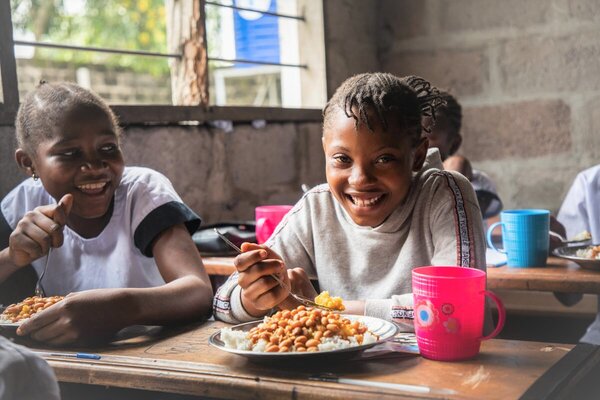New report confirms game-changing impact of health and nutrition in school

School-based programmes such as free meals, vaccinations and deworming can be game-changers for school-age children and adolescents, especially from poorer backgrounds, the report says. Such schemes also help keep children in school, ensuring that government investment in education is not wasted.
“Investing in health and nutrition in school, and specifically in school meals, is about investing in the learning and the learner,” said Carmen Burbano, Director of WFP’s School-Based Programmes Division. “Providing children with services that support their health, nutrition, and overall well-being is crucial if we are to ensure that every child can learn and grow up healthy, and for communities and countries to thrive.”
The global report Ready to learn and thrive: School health and nutrition around the world was launched today by WFP, along with the United Nations Educational, Scientific and Cultural Organization (UNESCO), United Nations Children’s Fund (UNICEF), Food and Agriculture Organization (FAO), Global Partnership for Education (GPE), World Bank, and World Health Organization (WHO). Combining multiple data sources and case studies from around the world, it provides the first overview of school health and nutrition policies and programmes globally.
The report shows that nine in 10 countries in the world currently implement School Health and Nutrition (SHN) programmes. More than 100 countries have school-based vaccination programmes, and more than 450 million school-age children are dewormed every year in schools in low- and middle-income countries.
Although many countries have made efforts to integrate different schemes, for example delivering school meals along with vaccinations, the report noted that relatively few have taken the next step and adopted truly comprehensive approaches in which a range of initiatives is delivered systematically.
Unfortunately, many of the children and adolescents who could benefit most from comprehensive health and nutrition packages are not reached because they are not in school or because existing programmes have low coverage.
The report confirmed that school feeding programmes are the world’s most extensive social safety net, providing meals to almost half of all children in primary school. Research has shown that school meals programmes can increase enrolment rates by 9% and attendance by 8%. The significant expansion of school feeding programmes over the last decade shows what political commitment can achieve, the report’s authors said.
“This report shows governments’ recognition of the value of School Health and Nutrition, but more needs to be done. The actions already in place need to be extended to more comprehensive packages to effectively protect children from the multiple crises the world is facing,” Burbano said.
SHN programmes are a cost-effective investment, the report said, noting that school feeding programmes deliver US$9 in returns for every US$1 invested, and school programmes that address mental health can potentially provide a return on investment of US$21.5 for every US$1 invested over 80 years.
Despite the benefits of SHN, only US$2 billion is invested each year in addressing the health needs of school-age children and adolescents. At the same time, some US$210 billion is spent on educating this age group in low- and lower middle-income countries. To maximize investments made in education, funding for programmes promoting the health and well-being of school-age children and adolescents must increase substantially, the report said.
# # #
About the United Nations World Food Programme
The U.N. World Food Programme is the world’s largest humanitarian organization, saving lives in emergencies and using food assistance to build a pathway to peace, stability and prosperity for people recovering from conflict, disasters, and the impact of climate change.
Topics
Nutrition School meals Food securityContact
For more information please contact (firstname.lastname@wfp.org):
Martin Penner, WFP/ Rome, Mob. +39 345 6142074
Follow us on Twitter @wfp_media
